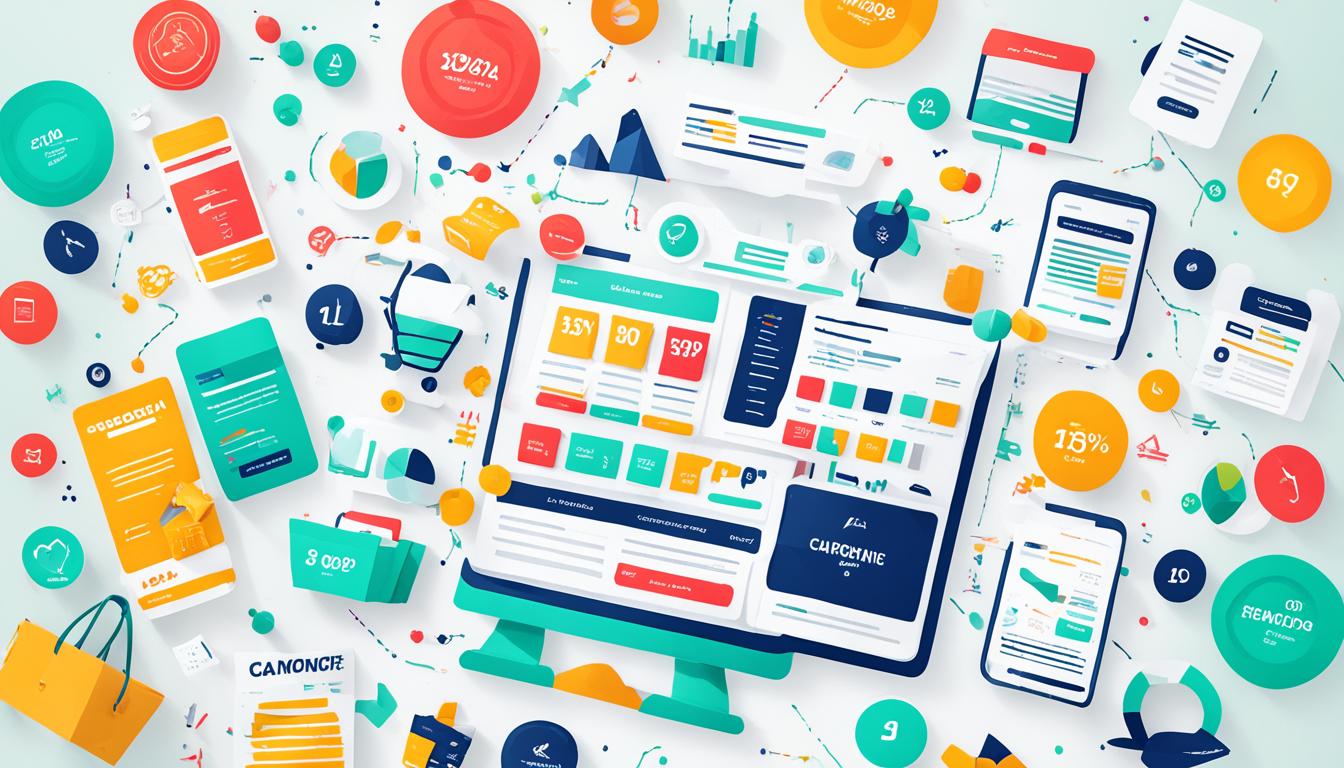In today’s competitive business landscape, effective marketing strategies play a pivotal role in driving growth and success. Two key categories of marketing are business-to-business (B2B) and business-to-consumer (B2C) marketing. While both have the ultimate goal of reaching target audiences and driving sales, there are significant differences in their approaches and tactics.
B2B marketing involves businesses selling products or services to other businesses, focusing on logical, process-driven purchasing decisions. On the other hand, B2C marketing targets individual consumers, appealing to their emotions and preferences to drive purchasing decisions. Understanding the differences between these two approaches is crucial for marketers to develop effective strategies for businesses.
Key Takeaways:
- B2B marketing targets businesses and focuses on logical, process-driven purchasing decisions.
- B2C marketing targets individual consumers and appeals to their emotions and preferences.
- Understanding the differences between B2B and B2C marketing is essential for developing effective marketing strategies.
- B2B marketing strategies prioritize building relationships, branding, and open communication.
- B2C marketing tactics focus on transactional relationships, emotional messaging, and simplifying the decision-making process.
B2B vs B2C Marketing: Customer Relationships
In the world of marketing, building strong customer relationships is essential for long-term success. This holds true for both B2B and B2C marketing, but the approach to relationship-building differs between the two.
In B2B marketing, establishing personal relationships with clients plays a crucial role. As businesses make logical, process-driven purchasing decisions, building trust and nurturing relationships is paramount. B2B marketers understand that by developing strong personal connections during the buying cycle, they can differentiate themselves from competitors and foster long-term loyalty.
On the other hand, B2C marketing focuses on transactional relationships. In this context, the goal is to create a seamless customer experience that drives immediate sales. B2C marketers prioritize strategies that enhance the customer journey and make every interaction enjoyable and memorable.
While both B2B and B2C marketing aim to build customer relationships, the emphasis is different. B2B marketing thrives on personalization and open communication, while B2C marketing prioritizes delivering exceptional customer experiences.
Take a look at the table below for a comparison of customer relationships in B2B and B2C marketing:
| B2B Marketing | B2C Marketing |
|---|---|
| Focuses on building personal relationships | Emphasizes transactional relationships |
| Establishes trust and loyalty through relationship building | Creates seamless customer experiences for immediate sales |
| Personalization and open communication | Exceptional customer experience |
By understanding the differences in customer relationship approaches between B2B and B2C marketing, marketers can tailor their strategies and tactics accordingly. Whether it’s cultivating personal connections or delivering exceptional experiences, the goal remains the same – enhancing customer relationships for business growth.
Continue reading to discover the importance of branding in B2B and B2C marketing.
B2B vs B2C Marketing: Branding
In B2B marketing, branding plays a critical role in positioning the business and creating brand recognition among the target audience. It focuses on establishing a strong identity and conveying credibility to potential clients. Effective branding in B2B marketing helps to differentiate the business from competitors and build lasting relationships with customers.
On the other hand, B2C marketing places a greater emphasis on messaging that creates an emotional connection with consumers. The goal is to evoke positive feelings and drive brand loyalty, ultimately leading to repeat purchases. Branding in B2C marketing is all about capturing the consumer’s attention, generating desire, and making the brand memorable.
While the approaches may differ, branding is equally important in both B2B and B2C marketing. Here’s why:
Importance of Branding in B2B and B2C Marketing
Conveying Credibility: A strong brand represents trust, reliability, and expertise. In B2B marketing, businesses are more likely to work with brands they perceive as credible and reputable. Similarly, consumers in B2C marketing tend to choose brands they trust and believe in.
Creating Memorable Experiences: Branding allows businesses to create a distinct identity and personality that resonates with their target audience. Memorable experiences leave a lasting impression on customers and increase brand recall, which translates into increased sales and customer loyalty.
Motivating Purchase Decisions: A well-established brand gives customers confidence in their purchase decisions. In both B2B and B2C marketing, branding influences perceptions about quality, value, and reliability. Positive brand associations can be powerful motivators for customers to choose a particular product or service.
Building Relationships: Branding helps to build strong relationships with customers, whether they are businesses or individual consumers. By consistently delivering on promises and providing a positive experience, brands can foster loyalty and advocacy, leading to long-term customer relationships.
Benefits of Branding in B2B and B2C Marketing
Branding offers several benefits for both B2B and B2C marketing:
- Increased Awareness and Recognition: Strong branding creates greater visibility and recognition in the marketplace, making it easier for customers to identify and choose a brand.
- Competitive Advantage: A well-defined brand differentiates businesses from their competitors, helping them stand out and attract customers in a crowded marketplace.
- Higher Perceived Value: A strong brand often commands a higher perceived value, allowing businesses to charge premium prices and achieve better profit margins.
- Customer Loyalty: Brands that consistently deliver on their promises and provide exceptional experiences foster customer loyalty, resulting in repeat purchases and increased customer lifetime value.
- Word-of-Mouth Marketing: A strong brand encourages customers to share their positive experiences with others, leading to valuable word-of-mouth marketing and organic brand advocacy.
By focusing on branding in both B2B and B2C marketing, businesses can establish themselves as trusted, memorable, and desirable choices in their respective markets. Successful branding strategies are key to building long-term success and achieving business growth.
B2B vs B2C Marketing: Decision-making Process
In B2B marketing, the decision-making process involves open communication between businesses to determine if there is a good fit. B2B customers evaluate both rational and emotional motivations when making decisions. On the other hand, B2C marketing aims to simplify the decision-making process, focusing on influencing consumer purchases through persuasive advertising and providing a seamless shopping experience.
| Factors | B2B Marketing | B2C Marketing |
|---|---|---|
| Decision-making process | Complex and involves open communication | Streamlined and quick |
| Motivations | Rational and emotional | Primarily emotional |
| Focus | Building trust through relationships | Creating a seamless shopping experience |
| Communication | Open, transparent, and ongoing | Persuasive advertising and marketing messages |
B2B vs B2C Marketing: Marketing Mix
The marketing mix plays a crucial role in both B2B and B2C marketing, but there are significant differences in how it is executed. In B2B marketing, the focus is on complex products that often require detailed explanations to showcase their value. Conversely, B2C marketing emphasizes emotional communication and branding to create strong connections with consumers.
In B2B marketing, product complexity is a key consideration. Businesses need to provide comprehensive information and demonstrate how their products can solve specific challenges and meet the needs of other businesses. This may involve technical specifications, case studies, and in-depth demonstrations. The goal is to build trust and establish the business’s expertise in the industry.
On the other hand, B2C marketing relies heavily on emotional communication. Brands tap into consumers’ desires, aspirations, and lifestyles to create compelling messaging that resonates with their target audience. Emotional storytelling, visually appealing imagery, and relatable content are employed to forge a deep connection and motivate consumers to make a purchase.
Price sensitivity is another key factor in B2C marketing. Consumers are often more price-conscious and responsive to discounts, promotions, and competitive pricing. Marketers must carefully consider pricing strategies to attract and retain consumers in this highly competitive landscape.
The sales process also differs between B2B and B2C marketing. In B2B marketing, the sales cycle tends to be longer and more complex, involving multiple stakeholders and decision-makers. Building relationships, nurturing leads, and providing ongoing support are vital throughout the process. Conversely, B2C marketing typically involves quicker, more transactional sales processes, where immediate decision-making and seamless shopping experiences are essential.
| B2B Marketing | B2C Marketing | |
|---|---|---|
| Product Focus | Complex products and services | Emotionally appealing products |
| Communication | Detailed explanations and technical specifications | Emotional storytelling and relatable messaging |
| Price Sensitivity | Less price-sensitive, value-driven | More price-sensitive, responsive to discounts and promotions |
| Sales Process | Longer and more complex, involving multiple decision-makers | Quicker and transactional, immediate decision-making |
B2B vs B2C Marketing: Marketing Channels
The choice of marketing channels plays a crucial role in both B2B and B2C marketing. While there are similarities in the channels used, there are also notable differences that cater to the specific needs of each type of marketing.
Online Marketing:
In the digital age, online marketing has become essential for both B2B and B2C businesses. This includes activities such as search engine optimization (SEO), pay-per-click (PPC) advertising, email marketing, and more. Online marketing allows businesses to reach a wider audience and target customers directly through various digital platforms.
In both B2B and B2C marketing, content plays a crucial role in attracting and engaging customers. B2B businesses often create informative articles, case studies, and whitepapers to showcase their expertise and provide value to potential clients. B2C businesses, on the other hand, focus on creating compelling and entertaining content such as videos, blog posts, and social media content to capture the attention and interest of consumers.
Social media platforms have become powerful marketing channels for both B2B and B2C businesses. B2B marketers can leverage platforms like LinkedIn to connect with industry professionals, share valuable content, and establish thought leadership. B2C marketers, on the other hand, utilize platforms like Facebook, Instagram, and TikTok to engage with their target audience, promote products or services, and build brand loyalty.
Traditional Marketing Methods:
While online and digital channels dominate the marketing landscape, traditional marketing methods still have relevance in both B2B and B2C marketing. B2B businesses often utilize trade shows, conferences, and industry events to network, showcase products, and build connections with potential clients. B2C businesses may employ traditional methods such as print advertising, direct mail campaigns, or television commercials to increase brand awareness and reach a broader consumer base.
The key to successful marketing in both B2B and B2C contexts is finding the right mix of channels that effectively reach and engage the target audience.
Use B2C Marketing Tactics for B2B Marketing
B2B marketers can take advantage of certain B2C marketing tactics to enhance their strategies and better engage their target audience. By incorporating elements such as personalization, storytelling, emotional branding, and creating memorable experiences, B2B marketers can create more impactful and relatable marketing campaigns.
Personalization in B2B Marketing
Incorporating personalization techniques in B2B marketing allows businesses to tailor their messaging and content to individual clients or target accounts. By understanding specific pain points, challenges, and goals, B2B marketers can deliver relevant and customized experiences that resonate with their audience. This can include personalized email campaigns, account-based marketing initiatives, and dynamic website content.
Storytelling in B2B Marketing
Storytelling is a powerful tool that can captivate and engage audiences. B2B marketers can leverage storytelling techniques to convey their brand’s unique value proposition, highlight success stories, and create emotional connections with their target audience. By crafting compelling narratives, B2B marketers can differentiate themselves from competitors and leave a lasting impression on potential clients.
Emotional Branding in B2B Marketing
Emotional branding is not limited to B2C marketing. B2B marketers can also tap into emotions to build stronger connections with their target audience. By humanizing their brand, showcasing company culture, and highlighting the impact their products or services can have on clients’ businesses, B2B marketers can create positive emotional associations that drive loyalty and long-term partnerships.
Creating Memorable Experiences in B2B Marketing
Delivering outstanding customer experiences is key to successful B2B marketing. By focusing on creating memorable experiences throughout the buyer’s journey, from initial contact to post-purchase support, B2B marketers can build trust, foster loyalty, and differentiate themselves from competitors. This can involve personalized interactions, exceptional customer service, and value-added initiatives that go beyond expectations.
By adopting these B2C marketing tactics, B2B marketers can elevate their strategies and connect with their target audience on a deeper level. Personalization, storytelling, emotional branding, and creating memorable experiences all contribute to building strong relationships and driving business growth in the B2B sector.
| B2C Marketing Tactics | B2B Marketing Applications |
|---|---|
| Personalization | Tailoring messaging to individual clients or target accounts |
| Storytelling | Conveying the brand’s unique value proposition and creating emotional connections |
| Emotional Branding | Humanizing the brand, showcasing company culture, and building positive emotional associations |
| Creating Memorable Experiences | Delivering outstanding customer experiences throughout the buyer’s journey |

Human to Human Marketing
In today’s digital age, where businesses strive to stand out in the sea of competition, human to human marketing has emerged as a powerful strategy. It emphasizes the importance of building genuine, personal connections with customers, recognizing that behind every purchase decision is a human being with emotions, desires, and needs.
One of the key aspects of human to human marketing is personalization. Tailoring marketing messages and experiences to individual customers creates a sense of relevance and shows that the business understands their unique needs. By using data-driven insights and segmentation, companies can deliver targeted content and offers that resonate with customers on a deeper level.
Emotional storytelling is another essential element of human to human marketing. By crafting narratives that evoke emotions and engage the audience on a personal level, businesses can create memorable experiences that leave a lasting impact. This storytelling approach allows brands to connect with customers’ emotions, values, and aspirations, building trust and loyalty along the way.
Building trust is fundamental in human to human marketing. Customers are more likely to engage with brands they trust, and this trust is nurtured through transparency, open communication, and delivering on promises. By showing authenticity and consistently providing value, businesses can establish strong relationships with their customers.
Human to human marketing helps businesses move beyond transactional exchanges and embrace a more holistic approach to customer relationships. By focusing on personalization, emotional storytelling, and building trust, companies can create meaningful connections with their target audience. In this era of digital interactions, putting the human element back into marketing is more important than ever.
Conclusion
After exploring the key differences between B2B and B2C marketing, it is clear that these two approaches require distinct strategies and tactics to effectively reach their target audiences. B2B marketing emphasizes the importance of relationship building, positioning, and open communication to establish trust and drive long-term business success. On the other hand, B2C marketing focuses on transactional relationships, emotional messaging, and simplifying the decision-making process to drive immediate sales.
While B2B and B2C marketing have their unique characteristics, there are also opportunities to learn from each other. B2B marketers can benefit from adopting certain B2C tactics, such as personalization, storytelling, emotional branding, and creating memorable experiences, to make their marketing more engaging and relatable. Similarly, B2C marketers can draw inspiration from B2B marketing’s focus on relationship building and open communication to foster deeper connections with their customers.
In summary, the key takeaways from the comparison of B2B and B2C marketing are:
- B2B marketing prioritizes relationship building and open communication, while B2C marketing focuses on transactional relationships and simplifying the decision-making process.
- B2B marketing emphasizes positioning and trust-building, while B2C marketing relies on emotional messaging and creating memorable experiences.
- Both B2B and B2C marketing have unique benefits, and marketers can enhance their strategies by adopting tactics from each other.
| Benefits of B2B Marketing | Benefits of B2C Marketing |
|---|---|
| Focuses on long-term relationships | Drives immediate sales |
| Targets a niche and specific audience | Reaches a broad consumer base |
| Requires in-depth product knowledge | Utilizes emotional messaging and branding |
| Relies on open communication and trust | Simplifies the decision-making process |
| Offers higher customer lifetime value | Aims for repeat purchases and brand loyalty |
Resources
Here are some recommended resources for further learning about B2B and B2C marketing strategies and tactics. These resources include guides, articles, and other helpful materials to help marketers navigate the complexities of both B2B and B2C marketing.
B2B Marketing Guides
- HubSpot: B2B Marketing Strategy Guide – A comprehensive guide to developing effective B2B marketing strategies.
- Neil Patel: The Ultimate B2B Marketing Guide – Learn the best practices and tactics for successful B2B marketing campaigns.
- MarketingProfs: B2B Marketing Handbook – A collection of resources and insights to help marketers excel in B2B marketing.
B2C Marketing Guides
- Content Marketing Institute: The Ultimate Guide to B2C Content Marketing – Discover how to create compelling content for B2C audiences and drive engagement and conversions.
- Social Media Examiner: B2C Social Media Marketing – Learn how to leverage social media platforms to connect with B2C customers and boost brand awareness.
- Campaign Monitor: B2C Email Marketing Guide – Unlock the power of email marketing in B2C campaigns with this comprehensive guide.
Marketing Strategy Resources
- American Marketing Association: Marketing Strategy Toolkit – Access a wide range of templates, frameworks, and resources to develop effective marketing strategies.
- Google Digital Garage: Marketing Strategy Fundamentals – Learn the core principles of marketing strategy and how to apply them to drive business growth.
- LinkedIn Learning: Strategic Marketing Foundations – Dive into the fundamentals of strategic marketing and gain insights from industry experts.
E-Book: B2B Marketing
Looking to master B2B marketing? Our comprehensive e-book provides a complete guide to B2B marketing strategies and tactics. Whether you’re new to B2B marketing or an experienced professional, this resource will help you navigate the complexities of industrial marketing and develop successful B2B campaigns.
In this e-book, you’ll find a detailed exploration of B2B marketing, including a comparison to B2C marketing. Understanding the differences between these two approaches is crucial for crafting effective B2B marketing strategies. We also provide valuable insights into developing a B2B marketing strategy, offering practical frameworks and real-life examples to guide you through the process.
Ready to take your B2B marketing to the next level? Access our e-book to gain valuable knowledge and actionable strategies that will drive business growth. Download your copy now and unlock the secrets to successful B2B marketing.
FAQ
What are the main differences between B2B and B2C marketing?
B2B marketing focuses on logical process-driven purchasing decisions, while B2C marketing focuses on emotion-driven purchasing decisions.
How does relationship building differ in B2B and B2C marketing?
In B2B marketing, building personal relationships is crucial for long-term success, while B2C marketing focuses on transactional relationships.
What role does branding play in B2B and B2C marketing?
In B2B marketing, branding is focused on positioning the business and building recognition, while in B2C marketing, it aims to create an emotional connection and drive loyalty.
How do the decision-making processes differ in B2B and B2C marketing?
B2B marketing involves open communication and evaluates both rational and emotional motivations, while B2C marketing aims to simplify the decision-making process and influence purchases.
What are the differences in the marketing mix between B2B and B2C marketing?
B2B marketing deals with complex products and focuses on detailed explanations, while B2C marketing prioritizes emotional communication, branding, and price sensitivity.
Which marketing channels are commonly used in B2B and B2C marketing?
Both B2B and B2C marketing utilize online marketing, content marketing, and social media marketing. B2B marketing can also involve traditional methods like events and print campaigns.
Can B2C marketing tactics be used in B2B marketing?
Yes, B2B marketers can benefit from adopting B2C marketing tactics such as personalization, storytelling, emotional branding, and creating memorable experiences.
What is human to human marketing?
Human to human marketing emphasizes building a personal connection with customers through personalization, emotional storytelling, and fostering trust.
What are the key takeaways from comparing B2B and B2C marketing?
B2B and B2C marketing have distinct strategies and tactics, and understanding their differences is essential for developing effective marketing strategies. Both have unique benefits and can be enhanced by adopting certain tactics from each other.
Are there any resources available to learn more about B2B and B2C marketing strategies?
Yes, there are various resources available such as guides, articles, and other materials that provide comprehensive information on B2B and B2C marketing strategies and tactics.
Can I access an e-book to learn more about B2B marketing?
Yes, you can download our e-book, which is a comprehensive guide to B2B marketing, covering various aspects including industrial marketing, strategy frameworks, and real-life examples.



